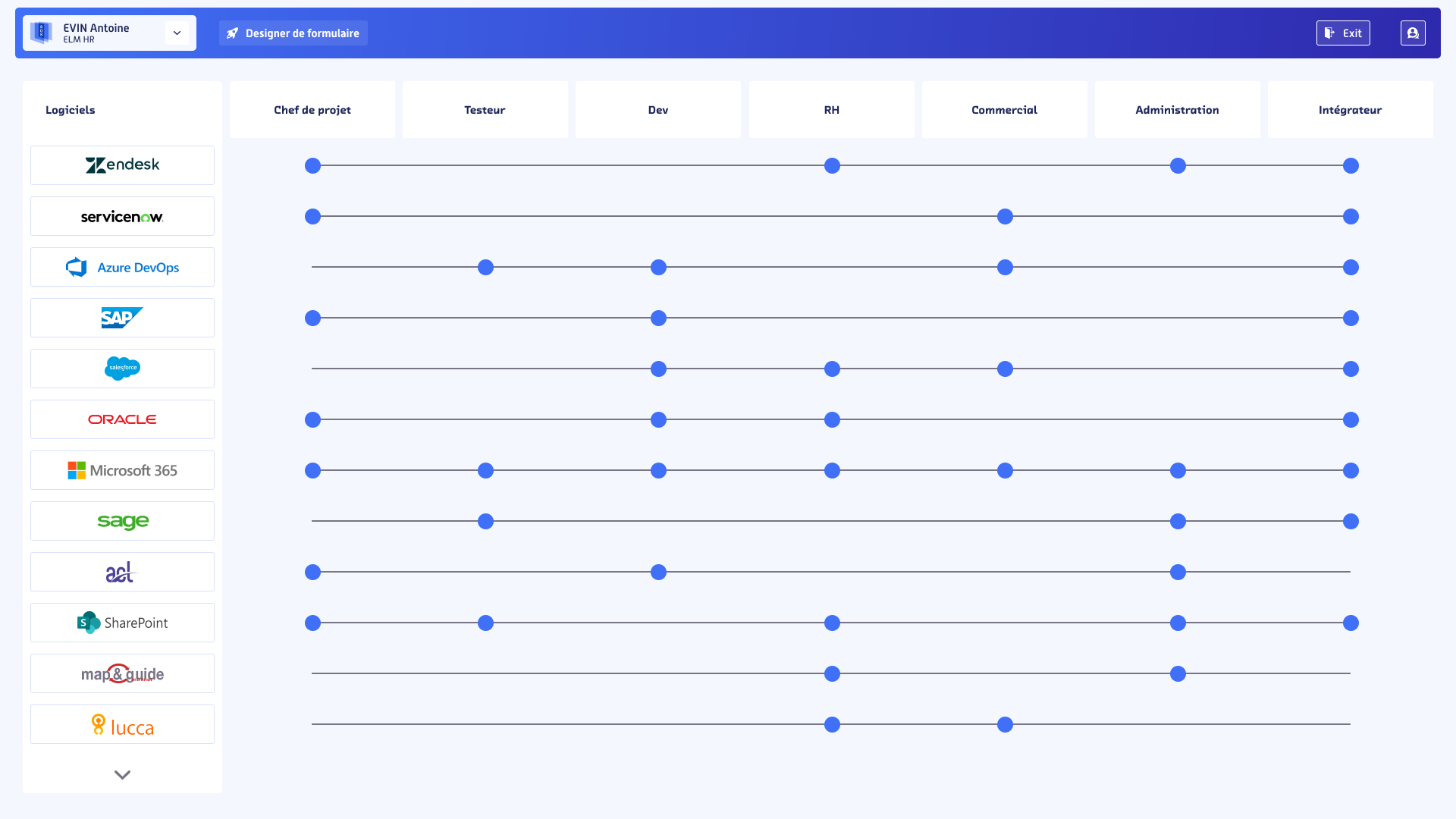No Code and Hyperautomation: Build your applications and automate your processes (BPM, Workflow, RPA, AI) without coding
Unite the power of no-code, workflows, and BPM to tackle your most complex challenges.
Without a single line of code:
✓ Create your own Apps and bots intuitively.
✓ Dare to use complex rules and OCR.
✓ Interconnect your Apps with the computer ecosystem.
✓ Ensure access security at any time.
Simplicity
For interconnected Apps open to your ecosystem.
1. Design your flow
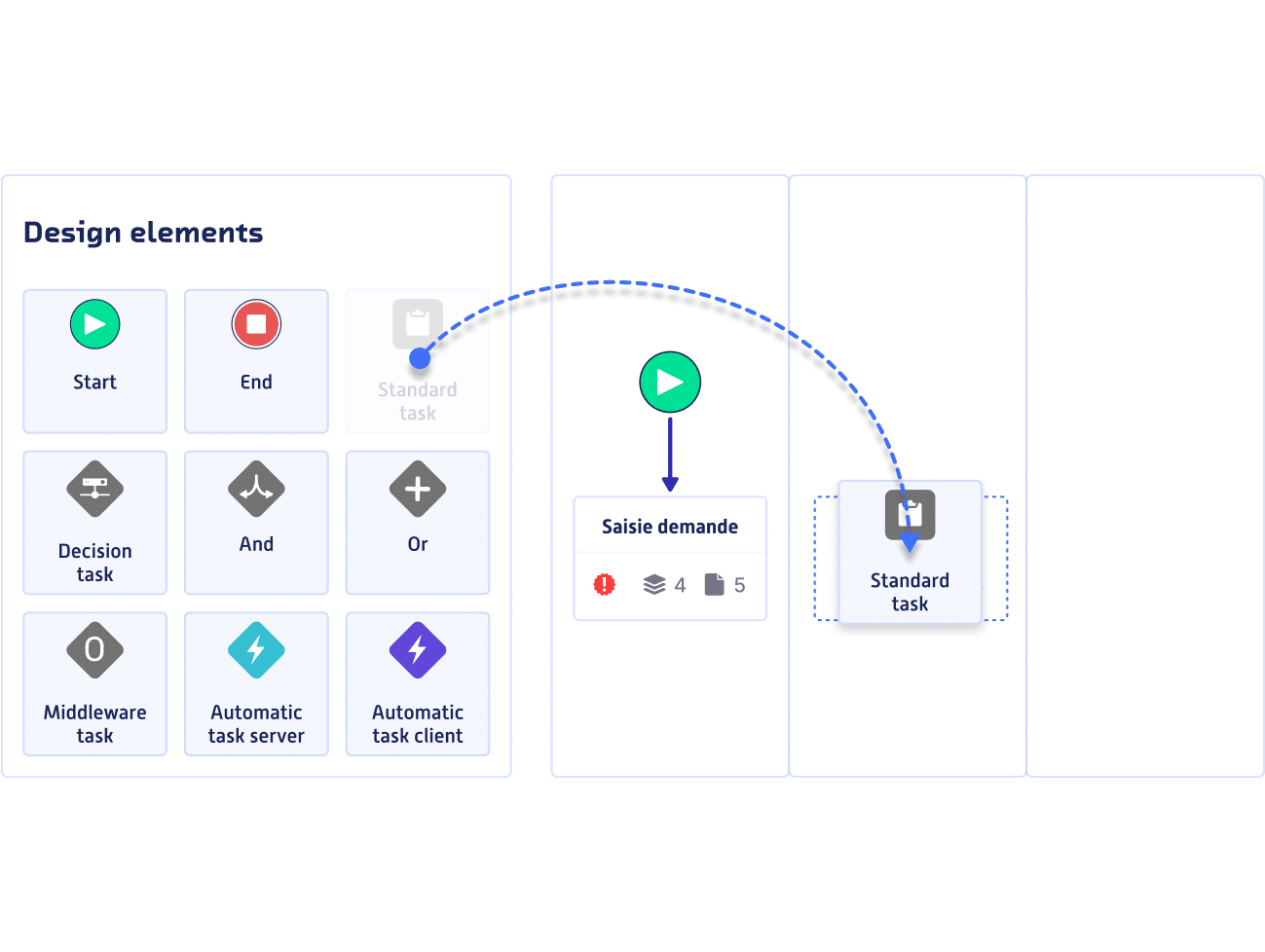
2. Assign the roles
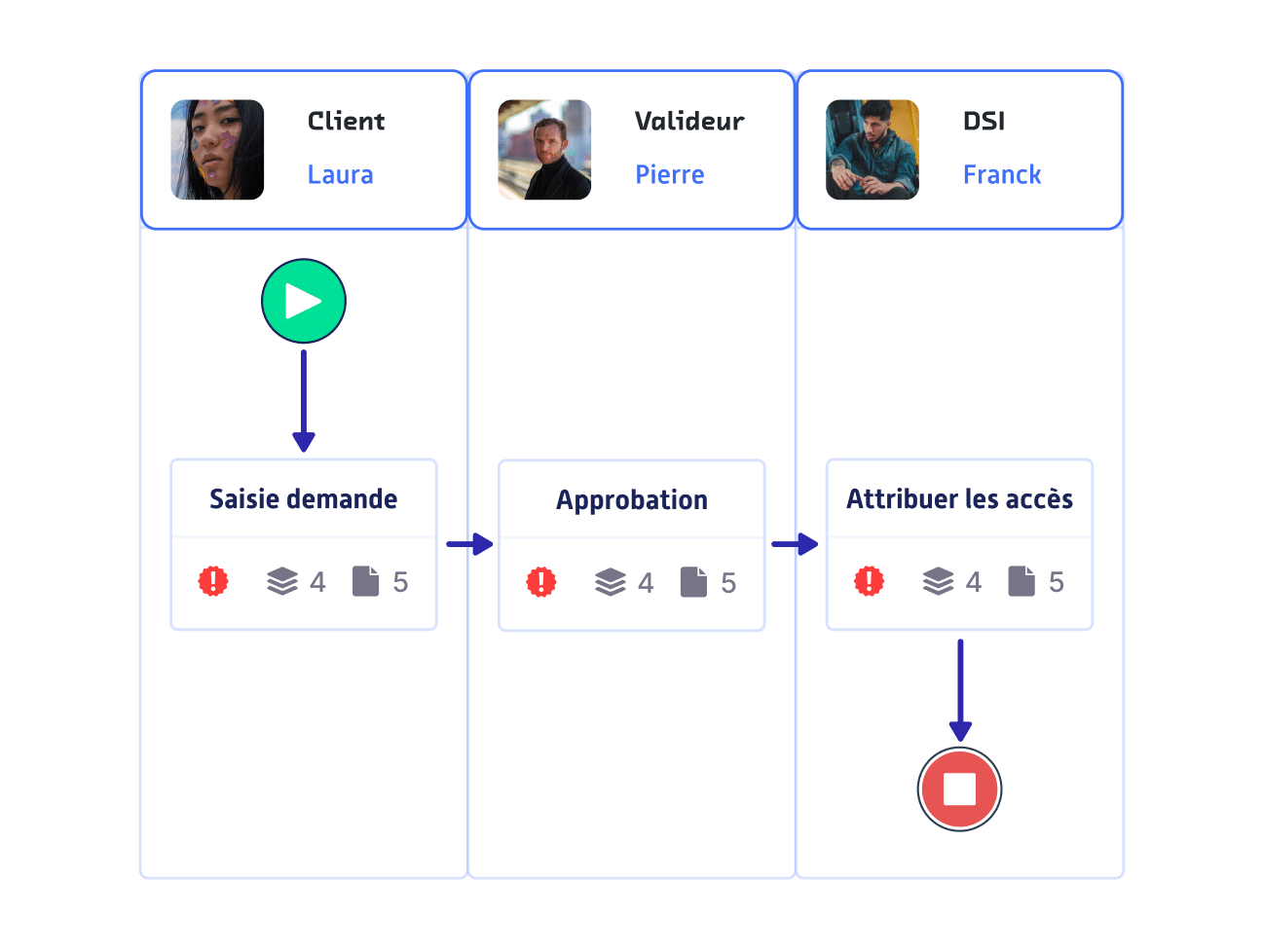
3. Design your interfaces
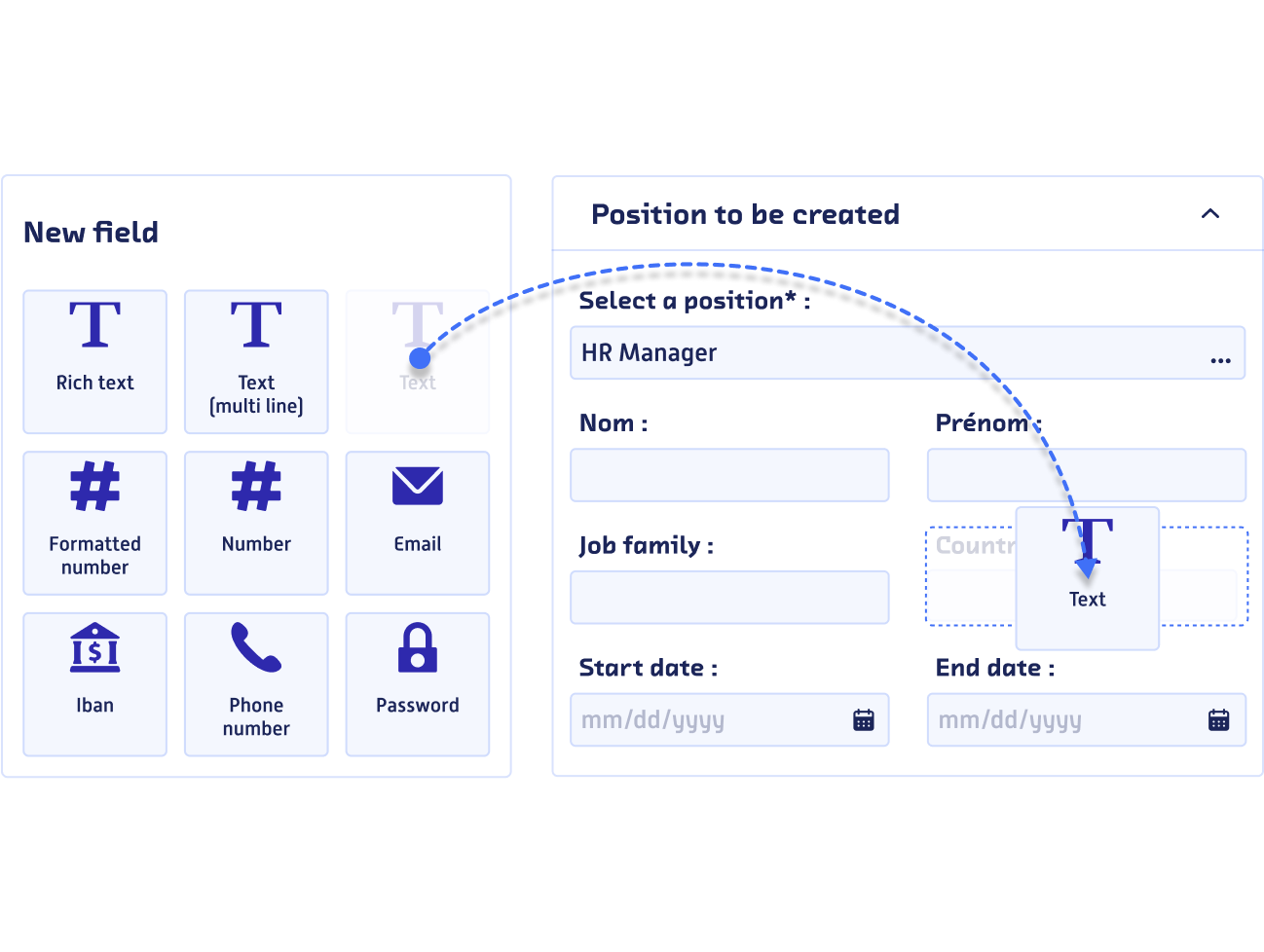
4. Define the management rules & interconnect your Apps
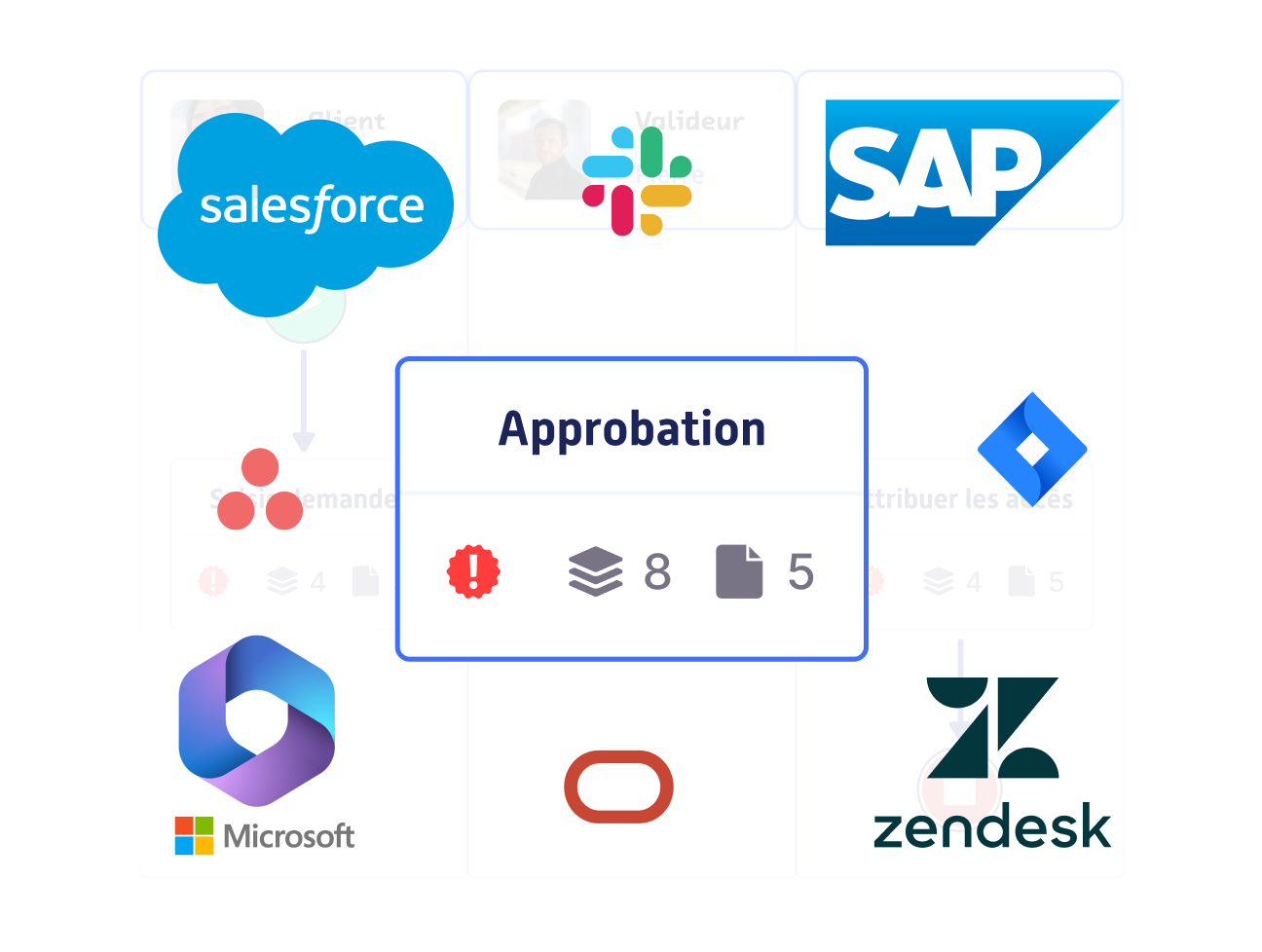
AI, OCR, QR Code, Photo…
Design
A professional and intuitive studio.
Drag-and-drop graphical interface
Extended graphical palette
Simplified connector integration through AI
Customization of the mobile interface
ROK… in your image.
Security
What no other application offers you.
Any collaborating movement updates your streams
Any stream modification updates your permissions
Because ROK manages hierarchies (responsibilities) rather than individuals
The No Code module
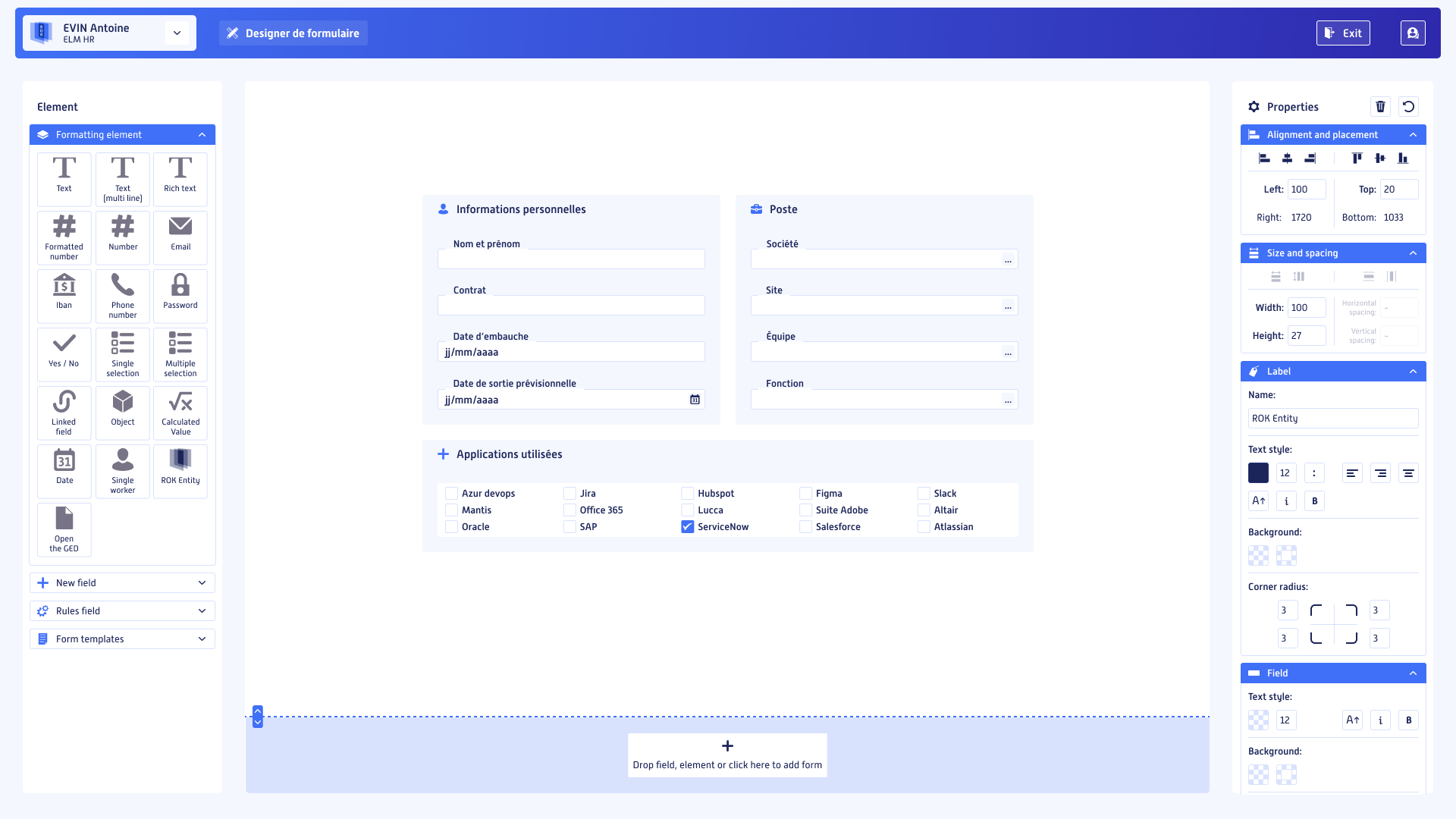
The main problem with No Code applications is that their proliferation compromises cybersecurity… whereas ROK strengthens it.
Scope
A complete workshop.
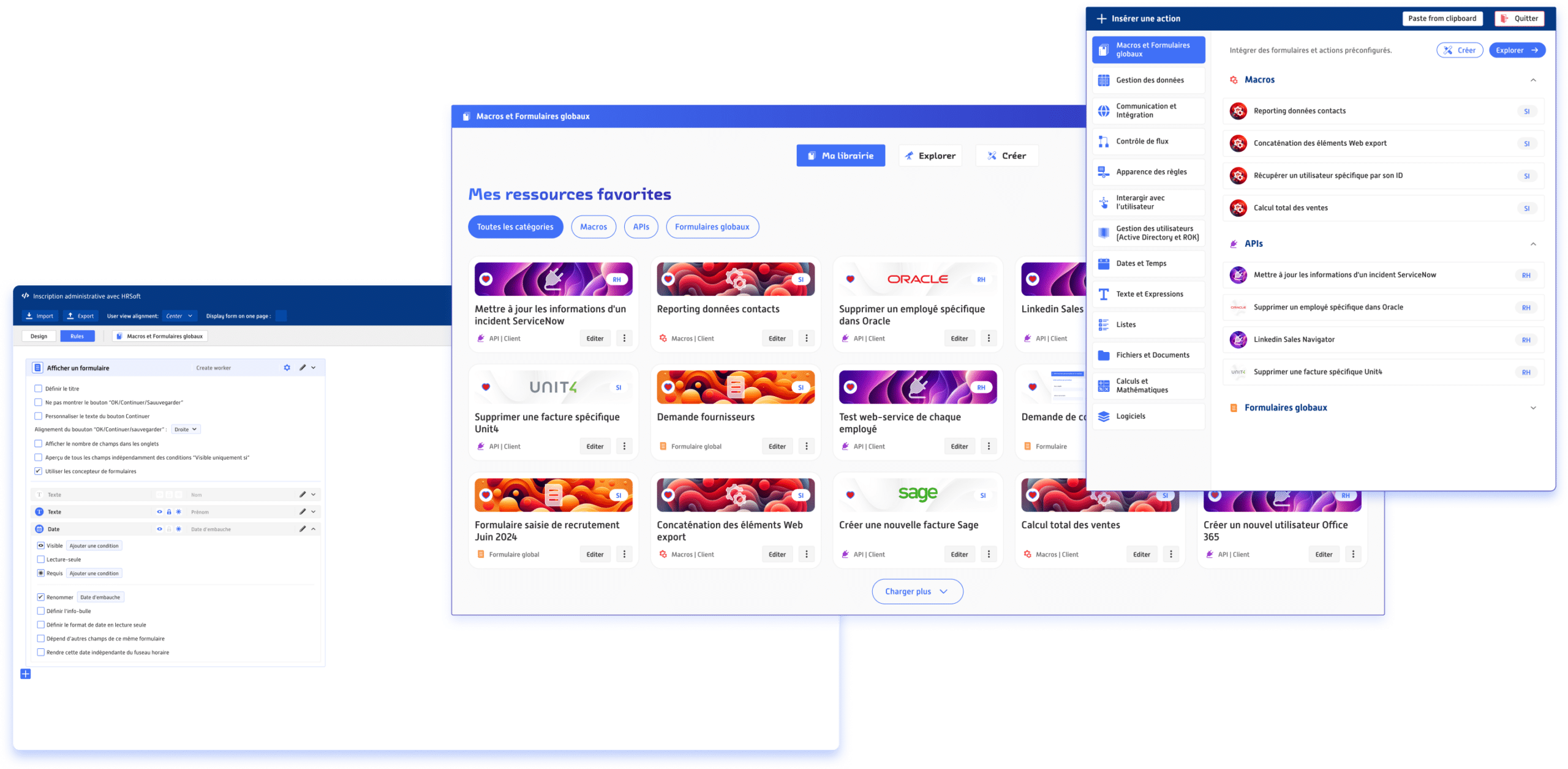
Workflow engine
BPM + RPA architecture
Rule engine
AI Web Services API
Form designer
Model even complex applications, orchestrate workflows, connect existing systems, and create robots.
ATAWADAC dashboard
A 360-degree view of your business.
Task status visualization
Risk control
Electronic document management
Integration of BI and custom reports
Proactive alerts
What you need when you need it.
ITSM
The best of Who’s Who and No Code.
1 - Input of information
Digitals inputs
Sources: HRIS, directories…
ROK
Source: Data entry form
2 - ROK HUB
Onboarding, moove, outboarding flows
Up-to-date application mapping
3 - ITSM
Provisioning
Pre-existing applications
Provisioning
Other applications
ROK will ensure real-time integrity between collaborators, assets, and application rights by building on what already works and filling in the gaps.
Comparative analysis: ROK vs other IBPM solutions, RPA, Low code / No Code
With its unique No Code modeling capability and its access rights management-centered approach, ROK offers unparalleled flexibility, simplicity, and security
- A true no-code platform, unlike mere renowned low-code solutions (limited connector list, lack of easy access for modification and maintenance, etc).
- Simple modeling, even for complex scenarios.
- Rapid and secure deployment in the cloud of interconnected applications (natural language APIs) in just a few days, both well-documented and easily maintainable.
- Instantly provide agile and secure access to applications.
- No-code interface for accessible automation to accelerate manual task processing and avoid errors, without the usual complexity in implementation that can be encountered.
- Integration of human intelligence into the automation process.
- Enables non-specialized users to create robots tailored to operational needs.
- Managing business processes completely without code.
- Designing and optimizing workflows accessible to non-technical users.
- Direct integration of access management, communication, risk, project management, and other functionalities.
- Simplified creation of API connectors through a natural language interface.
- Traceable exchanges and annotations for transparent communication with all stakeholders (users, security, technical teams, external contractors).
ROK Decoder: Your Questions, Our Answers!
The No Code has never been so clear.
Why use No Code platforms?
No code platforms aim to accelerate digital development by eliminating the need for manual coding and reducing deployment times. They contribute to the democratization of digital creation by empowering business users (citizen developers), thereby fostering innovation and freeing up time for IT teams. Overall, they enable significant cost reductions and offer a consistently positive ROI.
What are the limitations of these solutions?
Although these platforms offer a variety of pre-designed patterns and components, they are limited in terms of presentation possibilities and customization. Similarly, while offering a range of components and connectors, they encounter feasibility issues when deviating from standard applications (complex apps). Additionally, by nature (due to their widespread use) and by design, they open up vulnerabilities to cybercriminals and present security flaws that are difficult to manage.
Customization seems to be a limitation in No Code; what about with ROK?
Beyond providing a range of more or less extensive pattern models that no code solutions offer, ROK features a unique design workshop. Its intuitive drag-and-drop graphical interface and extensive graphic palette facilitate the creation of customized applications in a manner similar to PowerPoint, which offers patterns but also allows you to design a completely original slide from scratch. An ingenious rule engine enables the creation of both unique and multiple forms within the same application, thus opening the door to complex applications when the majority of offerings are limited to single forms.
The range of connectors seems to be limited to the store offered by the provider; what about with ROK?
ROK offers a modeling interface that allows the integration of any web service, including SOAP or REST, in natural language, i.e., without coding. ROK has also integrated AI to accelerate connector creation, assisting the modeler who wants to move faster. With this AI, ROK makes the use of a connector store, which is not always up-to-date and in any case limited, redundant. Finally, for the reluctant computer scientist or those dealing with a proprietary or very complex interface, ROK offers the possibility to code their own connector.
Another cited limitation of No Code is security. Does ROK take this issue seriously?
Indeed, the multitude of apps that can be developed, the ability to interconnect them with sensitive pre-existing company systems, and the fact that the solution is placed in the hands of non-IT users significantly increase the risk of security breaches. In terms of security, ROK is defined as ‘compliant & secure by design.’ It natively integrates the ability to interface with HRIS, IAM tools, and electronic directories like AD. The platform manages access mapping in real-time and transparently for the designer, including those related to the created application. It links with the company’s organizational charts, clearly exposing new areas of responsibility and automatically updating the risk mapping of SoD.
We have internal workflow solutions; what's the difference with no code, and isn't it redundant?
A no code application is designed to allow the creation of applications without writing source code. They aim to democratize app development, making it accessible to non-developers. A workflow software, on the other hand, is designed to automate processes and focuses on modeling, automating, and optimizing business workflows to improve operational efficiency, reduce human errors, and ensure better business process management. The goals are different; the former enables the creation of simple apps without worrying about their integration within the ecosystem or really about the impact in terms of optimizations and performance, while the latter aims at performance and optimization. They are therefore complementary, and sometimes redundant, which is unfortunate, costly overall, and not optimal from a security perspective.
ROK seems to combine No Code and workflow; what about that?
ROK is genetically an iBPMs solution. As such, it aims at organizational performance and business flow automation. Similarly, it allows for the generation of organizational charts, managing computer accesses, handling document management, and risk management. Significant work has been done to make it a fully no-code platform. As a result, in a single solution, you can aim for both the democratization of rapid and innovative applications and contribute to the automation and performance of your organization. This is made possible in a single platform that also guarantees the clarity of roles and responsibilities and the mapping of application rights, ensuring perfect security of what is developed.
There's a lot of talk about AI; what about at ROK?
AI is completely transforming our way of working while also raising real issues of confidentiality, as its learning is through the data it processes… therefore, your data. We have already integrated AI to create connectors (APIs) with third-party applications of your IT system under the modeler’s control. In June ’23, we will offer a brand new way to create applications via AI and a conversational interface, allowing this AI to propose an app through ROK that matches your wish, which you can amend in real
What is the cost of the platform?
The platform can be contracted either OnPremise or as SaaS. The average cost per user for SaaS is less than 5 euros.
Go ahead and get started right now!
Learn more: No-Code and Hyperautomation (workflow, bpm, rpa, ai)
No-code and hyperautomation: create, optimize, and automate your applications without development
The duo of no-code and hyperautomation (workflow, bpm, rpa, ai) is disrupting the way companies design, adapt, and manage their business processes. It’s no longer just a tech trend—it’s a structural revolution. By enabling application creation without development, this approach redefines roles within the organization: business teams become active agents of transformation, with no technical dependency.
The strength of the AI-assisted No-Code platform lies in its ability to connect, automate, and orchestrate complex tasks. It relies on an orchestration engine to automate your processes, based on open standards and capable of interacting with all components of the information system. Thanks to application interconnection via APIs and web services, the company operates intelligent and secure workflows.
By combining no-code development, artificial intelligence applied to No-Code, and complex process modeling tools, this solution ensures long-term organizational agility. All within an intuitive interface that simplifies business rule configuration, data management, and user experience customization.
To learn more, explore the full approach to hyperautomation (workflow orchestration, bpm, rpa, ai, no-code) behind this silent revolution.
No-code and hyperautomation serving operational performance
Adopting no-code and hyperautomation (workflow, bpm, rpa, ai) means building a system capable of responding to the unexpected with precision. Automation is no longer rigid—it becomes adaptive, contextual, and fully focused on the end user. The goal: to simplify, secure, and accelerate business workflows. This approach to workflow automation drastically reduces processing time and application maintenance costs.
One of the pillars of this approach is the personalization of business processes. Every workflow, form, and interface can be configured to reflect the realities of a specific job function or industry. IT digitization thus becomes a key differentiator. And with integrated predictive analytics, operational decisions are based on real trends rather than static rules.
The platform also leverages advanced modules such as OCR and intelligent recognition, which capture data from physical or digital documents and inject it into automation circuits. The result: seamless processing—no rekeying, no friction. All of this is supported by high-level application security and granular business workflow management.
This approach easily connects to modules of generative AI and hyperautomation (workflow, rpa, bpm, ai, no-code) to enrich workflows through automated creation of content, reports, or recommendations.
No-code and hyperautomation as a driver of continuous digital innovation
The alliance between no-code and hyperautomation (workflow, bpm, rpa, ai) is not just about efficiency. It fosters the emergence of new practices. By enabling users to create their own tools, it accelerates the pace of digital transformation without compromising overall coherence. Continuous integration becomes a reality accessible to all, with real-time testing and deployment capabilities.
This logic also supports cloud migration, made easier by the agility of the no-code environment. Projects are portable, replicable, and can evolve without being locked into rigid frameworks. At the same time, the no-code approach enhances user experience design, as interfaces are created with—and for—end users. It leads to an optimized user experience, since feedback is directly integrated into development cycles.
Companies can also rely on an ever-expanding ecosystem of AI and automation connectors. Thanks to the integration of AI connectors and process automation, it becomes possible to enrich workflows with modules for automatic translation, data scoring, or semantic analysis. Each component strengthens operational efficiency while fitting into a coherent architecture.
This is the essence of the BOAT (Business Orchestration and Automation Technologies) model: delivering an agile, intelligent platform capable of supporting continuous growth by orchestrating flows, roles, and data.
No-code and hyperautomation as the foundation of unified and sustainable IT
In a context of growing technological complexity, no-code and hyperautomation (workflow, bpm, rpa, ai) provide a clear answer to silos and the slowness of traditional IT projects. It enables business process optimization by connecting existing applications and filling functional gaps without recoding the entire system. Business process management becomes visual, measurable, and adaptable in real time.
This paradigm also supports better infrastructure optimization. Resources are used at the right level. Data flows more efficiently, with automated checks at every step. Critical workflows are monitored, errors are handled automatically, and governance is ensured through configurable roles and rules.
Finally, this approach paves the way for a culture of distributed innovation. Business teams become active contributors to system modernization—autonomously, but within a secure framework. It’s a new vision of IT: closer, faster, and more human.
To fully leverage this momentum, explore advanced optimization and automation with ROK Solution and accelerate your journey toward intelligent, scalable, and results-driven IT.

